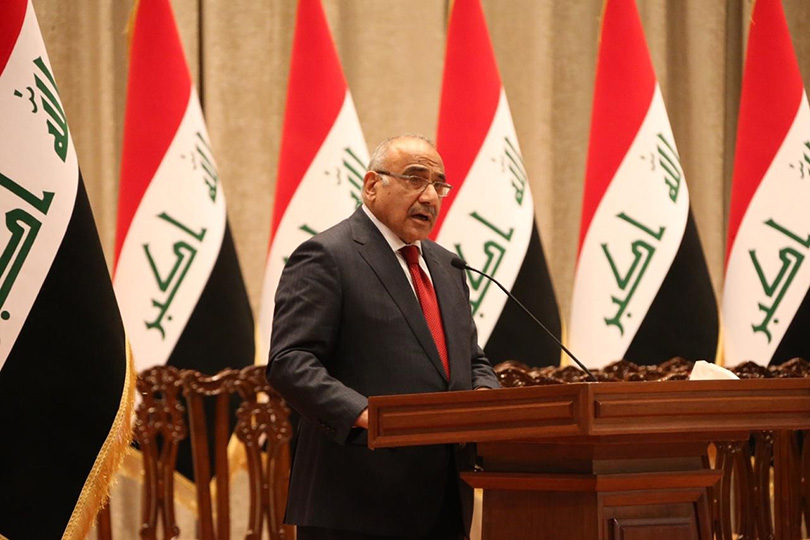When he was sworn in as Iraq’s new prime minister in late October 2018, Adel Abdul Mahdi vowed to fight corruption, address electricity and water shortages, create private sector jobs, and curb an entrenched system of political patronage that has long hamstrung Iraq’s ability to serve its people.
Abdul Mahdi’s agenda was as ambitious as it was necessary. It sought to calm public anger following the worst anti-government protests the country has seen in years, fueled by a severe water and sanitation crisis in Iraq’s south that had resulted from years of neglect and mismanagement of public resources. The prime minister’s pledge to choose his own ministers, rather than let political parties pick candidates, aimed to restore trust in a political process that many Iraqis had come to dismiss as corrupt and undemocratic.
But with the 100-day mark of his administration gone, Abdul Mahdi and his reform agenda appear to be faltering. He has been able to freely choose only a handful of ministers, while four ministerial positions remain vacant amid haggling among political parties insisting on their candidates. His budget has drawn widespread criticism for failing to shift resources away from salaries and the security sector toward services, agriculture, industrial development, and the reconstruction of war-torn areas in the country’s north.
Still, this political cycle has offered some reason to hope that Iraq’s 14-year-old democracy is gradually maturing. For the first time, the prime minister doesn’t hail from the Islamic Dawa Party, a Shiite political movement that opposed Saddam Hussein and emerged as the country’s dominant political force after his overthrow in 2003. The president was elected in parliament in line with the constitution, in contrast to previous years when the candidate was chosen in murky backroom negotiations. For the first time, the two main blocs in parliament are cross-sectarian alliances that include Shiite, Sunni, and Kurdish parties.
Despite these encouraging signs, Abdul Mahdi’s perceived lack of progress in filling his cabinet is gradually eroding public confidence. Many Iraqis on the streets call him “weak” and perceive him as unable to stand his ground in the face of powerful political interests.
An independent who chose not to run in the May 2018 parliamentary election, Abdul Mahdi was a compromise candidate for prime minister agreed on by the two biggest Shiite-led blocs in parliament: The reform bloc, Islah, led by the Saairun party of the populist Shiite cleric Moqtada al-Sadr, and Hadi al-Amiri’s construction bloc, Binaa, which encompasses the political wings of the Popular Mobilization Forces (PMF) and includes several groups with close ties to neighboring Iran.
In the absence of a popular mandate, Abdul Mahdi’s legitimacy depends on keeping the support of both blocs, a source of weakness according to some observers.
“He failed to work as a prime minister because the political powers which brought him to this position are in fact controlling him,” said Husham al-Hashimi, a political and security analyst. “It’s them who granted him the legitimacy, and they are threatening to withdraw it.”
Although both blocs had agreed to grant the prime minister a free hand to appoint his cabinet, Abdul Mahdi was able to independently appoint technocrats for only five out of 22 available ministries. The remaining ministers were nominated by political parties in line with the apportionment system, whereby parties divide the ministries based on their respective share of seats. The practice isn’t mandated by law, but it has become the norm in the post-Saddam era and is widely seen as a way for parties to gain access to public funds. Since taking office, the prime minister has drawn criticism for failing to upend the system.
“Here you have a prime minister whom everyone agreed upon. He had the support no other prime minister had ever. He shouldn’t waste the opportunity to make his choices,” said Raid Fahmi, a member of parliament for Sadr’s Saairun, which won 54 seats in parliament.
Saairun is one of the parties supporting Abdul Mahdi, and it led the call for a technocratic and independent government. It gave the prime minister relative freedom to appoint ministers to the slots it controlled under the apportionment system, including the ministries of foreign affairs, oil, health, electricity, and water. The last three are particularly crucial in addressing the root causes of popular unrest in southern Iraq.







Comments